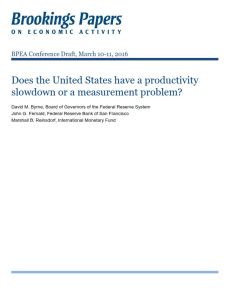Join getAbstract to access the summary!

Join getAbstract to access the summary!
David M. Byrne, John G. Fernald and Marshall B. Reinsdorf
Does the United States Have a Productivity Slowdown or a Measurement Problem?
Brookings Institution, 2016
What's inside?
Learn why your use of Google and Facebook may not be adding to the economy’s overall productivity.
Recommendation
Growth in US productivity has been decelerating since 2004, after a surge starting in the mid-1990s. This seems illogical, considering the technological progress that appears to have boosted efficiency. Could official statistics be missing some aspects of new technologies that make people and businesses more productive but that don’t show up in the metrics? Economists David M. Byrne, John G. Fernald and Marshall B. Reinsdorf find that the mismeasurement of various facets of GDP input may not be the likely story behind the perceived slowdown. getAbstract recommends this technical but informative and topical report to economists, policy makers and executives.
Summary
About the Authors
David M. Byrne, John G. Fernald and Marshall B. Reinsdorf are economists at the Federal Reserve Board, the Federal Reserve Bank of San Francisco and the International Monetary Fund, respectively.


















Comment on this summary